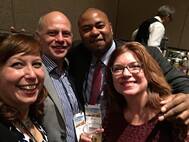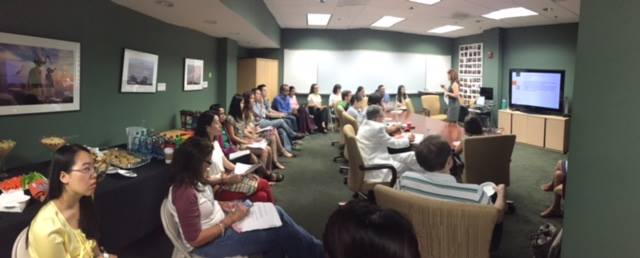Research Articles and Instruments

Friends who are also colleagues!
Here are some articles that I receive a lot of requests for. The measures detailed in these publications are all free for all scholarly, non-commercial use as long as they are properly cited. (If you are working with an editor/journal that requires evidence of permission to use measures, you can screenshot this statement.)
The Science of Team Science (SciTS)
If you are interested in my work as the co-director of the U-LINK (University of Miami Laboratory for Integrative Knowledge) initiative, this program evaluation report provides a fairly comprehensive overview of the program objectives, activities, and outcomes.
This article provides a roadmap for an interdisciplinary team science training and development program as well as measures for assessing team effectiveness: developing-and-evaluating-a-team-development-intervention-to-support-interdisciplinary-teams-2.pdf
(My team and I are available for consulting as well as interdisciplinary team trainings/workshops. We love doing this work!)
Clinical trial communication
If you are looking for measures of communication effectiveness in the context of clinical trial recruitment, this publication may be helpful: crc_comm_behaviors_measure_copy.pdf
Morgan, S.E., Mouton, A., Occa, A. & Potter, J. (2016). Clinical trial and research study recruiters’ verbal communication behaviors. Journal of Health Communication, 21, 765-772.
clinical_trial_and_research_study_recruiters_verbal_communication_behaviors.pdf
Morgan, S.E., Mouton, A., Occa, A., Potter, J (2016). The role of nonverbal communication behaviors in clinical trial and research study recruitment. Health Communication. (e-pub ahead of print) the_role_of_nonverbal_communication_behaviors_in_clinical_trial_and_research_study_recruitment.pdf
Organ donation
Morgan, S.E., Harrison, T.R., Chewning, L.V., Davis, L. & DiCorcia, M. (2007). Entertainment (mis)education: The framing of organ donation in entertainment television. Health Communication, 22, 143-151.
/uploads/9/2/6/9/9269501/hc_entertainment_miseducation.pdf
Morgan, S. E., Stephenson, M. T., Harrison, T. R., Afifi, W.A., & Long, S.D. (2008). Facts versus “feelings”: How rational is the decision to become an organ donor? Journal of Health Psychology, 13, 644-658.
/uploads/9/2/6/9/9269501/hpsych_facts_vs_feelings.pdf
Morgan, S.E., Harrison, T.R., Long, S.D., Afifi, W.A., & Stephenson, M.T. (2008). In their own words: The reasons why people will (not) donate organs. Health Communication, 23, 23-33.
/uploads/9/2/6/9/9269501/in_their_own_words.pdf
Morgan, S.E. (2008). The intersection of conversation, cognitions, and campaigns: The social representation of organ donation. Communication Theory, 19, 29-48.
/uploads/9/2/6/9/9269501/srt_and_od_comm_theory_final_edit.pdf
The file below includes measures I have used in projects to assess organ donation attitudes, knowledge, bodily integrity, the "ick factor," the "jinx factor" and other constructs. Researchers (whether students or faculty members) have permission to use these measures as long as they are properly credited and cited.
/uploads/9/2/6/9/9269501/organ_donation_measures_cog_and_noncog.doc
*** Please note that you can find more full-text articles on "academic Facebook," aka Research Gate*** https://www.researchgate.net/profile/Susan_Morgan3/
A relatively recent version of my CV: morgan_vita_march_2023.docx
The Science of Team Science (SciTS)
If you are interested in my work as the co-director of the U-LINK (University of Miami Laboratory for Integrative Knowledge) initiative, this program evaluation report provides a fairly comprehensive overview of the program objectives, activities, and outcomes.
This article provides a roadmap for an interdisciplinary team science training and development program as well as measures for assessing team effectiveness: developing-and-evaluating-a-team-development-intervention-to-support-interdisciplinary-teams-2.pdf
(My team and I are available for consulting as well as interdisciplinary team trainings/workshops. We love doing this work!)
Clinical trial communication
If you are looking for measures of communication effectiveness in the context of clinical trial recruitment, this publication may be helpful: crc_comm_behaviors_measure_copy.pdf
Morgan, S.E., Mouton, A., Occa, A. & Potter, J. (2016). Clinical trial and research study recruiters’ verbal communication behaviors. Journal of Health Communication, 21, 765-772.
clinical_trial_and_research_study_recruiters_verbal_communication_behaviors.pdf
Morgan, S.E., Mouton, A., Occa, A., Potter, J (2016). The role of nonverbal communication behaviors in clinical trial and research study recruitment. Health Communication. (e-pub ahead of print) the_role_of_nonverbal_communication_behaviors_in_clinical_trial_and_research_study_recruitment.pdf
Organ donation
Morgan, S.E., Harrison, T.R., Chewning, L.V., Davis, L. & DiCorcia, M. (2007). Entertainment (mis)education: The framing of organ donation in entertainment television. Health Communication, 22, 143-151.
/uploads/9/2/6/9/9269501/hc_entertainment_miseducation.pdf
Morgan, S. E., Stephenson, M. T., Harrison, T. R., Afifi, W.A., & Long, S.D. (2008). Facts versus “feelings”: How rational is the decision to become an organ donor? Journal of Health Psychology, 13, 644-658.
/uploads/9/2/6/9/9269501/hpsych_facts_vs_feelings.pdf
Morgan, S.E., Harrison, T.R., Long, S.D., Afifi, W.A., & Stephenson, M.T. (2008). In their own words: The reasons why people will (not) donate organs. Health Communication, 23, 23-33.
/uploads/9/2/6/9/9269501/in_their_own_words.pdf
Morgan, S.E. (2008). The intersection of conversation, cognitions, and campaigns: The social representation of organ donation. Communication Theory, 19, 29-48.
/uploads/9/2/6/9/9269501/srt_and_od_comm_theory_final_edit.pdf
The file below includes measures I have used in projects to assess organ donation attitudes, knowledge, bodily integrity, the "ick factor," the "jinx factor" and other constructs. Researchers (whether students or faculty members) have permission to use these measures as long as they are properly credited and cited.
/uploads/9/2/6/9/9269501/organ_donation_measures_cog_and_noncog.doc
*** Please note that you can find more full-text articles on "academic Facebook," aka Research Gate*** https://www.researchgate.net/profile/Susan_Morgan3/
A relatively recent version of my CV: morgan_vita_march_2023.docx

